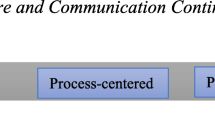Abstract
In this paper we develop a hermeneutic approach to the concept of competence. Patient competence, according to a hermeneutic approach, is not primarily a matter of being able to reason, but of being able to interpret the world and respond to it. Capacity should then not be seen as theoretical, but as practical. From the perspective of practical rationality, competence and capacity are two sides of the same coin. If a person has the capacity to understand the world and give meaning to the situation, he or she is able to make decisions, and is thus competent. People can fail in the area of practical rationality. They can feel ill at ease, uncomfortable or not at home in the situation. Under such conditions, they appear as incompetent, and urge caregivers to respond in such a way that their competence can be raised. The issue is not how to measure their incompetence, but how to help them to become more competent, that is to get a practical grip on their situation and to be able to live out their lives in such a way that they develop their identity in relations with others. From a hermeneutic point of view, assessing a patient's capacity implies focusing on the patient's way of meaning making and regarding her behavior from the perspective of practical rationality. The focus should not be on the assessment as a matter of fact, but on improving capacity. This requires allowing the patient to experience the world meaningfully and affording her, in the context of a supportive and trustful institutional environment, the possibility of developing a personal narrative where her choices are expressed verbally or non-verbally.
Similar content being viewed by others
REFERENCES
Agich, G.J. (1993) Autonomy and Long-term Care. Oxford: Oxford University Press.
Benaroyo, L. (2000) The Contribution of Philosophical Hermeneutics to Clinical Ethics. In D.C. Thomasma and J.L. Kissell (Eds.), The Health Care Professional as Friend and Healer. Building on the Work of Edmund D. Pellegrino(pp. 227–232). Washington, DC: Georgetown University Press.
Brody, H. (1992) Assisted Death—A Compassionate Response to a Medical Failure. The New England Journal of Medicine 327, 1384–1388.
Caplan, A.L. (1983) Can Applied Ethics be Effective in Health Care and Should it Strive to be? Ethics 93, 311–319.
Cases (2004) Health Care Analysis 12, 265–266.
Gadamer, H.G. (1990) What is Practice? The Conditions of Social Reason. In Reason in the Age of Science(pp. 69–87). Cambridge, MA: The MIT Press.
Leder, D. (1994) Toward a Hermeneutical Bioethics. In E.R., Dubose, R.P. Hamel, and L.J. O'Connell (Eds.), A Matter of Principles. Ferment in U.S. Bioethics(pp. 241–259). Valley Forge: Trinity Press International.
Mattingly, C. (1994) The Concept of Therapeutic “Emplotment.” Social Science and Medicine6, 811–822.
Moody, H.R. (1992) Ethics in an Aging Society Baltimore: The Johns Hopkins University Press.
Pellegrino, E.D., and Thomasma, D.C. (1981) A Philosophical Basis of Medical Practice. Toward a Philosophy and Ethic of the Healing Professions. New York/Oxford: Oxford University Press.
Pellegrino, E.D. (1982) Being Ill and Being Healed. Some Reflections on the Grounding of Medical Morality. In V. Kestenbaum (Ed.), The Humanity of the Ill( pp. 157–165). Knoxville: The University of Tennessee Press.
Pellegrino, E.D., and Thomasma, D.C. (1988) For the Patient's Good. The Restoration of Beneficence in Health Care.New York/Oxford: Oxford University Press.
Pellegrino, E.D., and Thomasma, D.C. (1993) The Virtues in Medical Practice.New York/Oxford: Oxford University Press.
Poirier, S., and Brauner, D.J. (1988) Ethics and the Daily Language of Medical Discourse. Hastings Center Report 18,5–9.
Steinkamp, N.L. (2003) European Debates on Ethical Case Deliberation. Medicine, Health Care and Philosophy6, 225–226.
Steinkamp, N.L., and Gordijn, B. (2003) Ethical Case Deliberation on the Ward. A Comparison of Four Methods. Medicine, Health Care and Philosophy6, 235–246.
Tan, J. (2003) The Anorexia Talking. The Lancet 362, 1246–1248.
Ten Have, H., and Gordijn, B. (2001) Theoretical Models and Approaches to Ethics. In: Bioethics in a European Perspective(pp. 51–82). Dordrecht: Kluwer Academic Publishers.
Tronto, J.C. (1993) Moral Boudaries. A Political Argument for an Ethics of Care.New York and London: Routledge (reprinted 1994).
Widdershoven, G.A.M. (1999) Care, Cure and Interpersonal Understanding. Journal of Advanced Nursing 29, 1163–1169.
Author information
Authors and Affiliations
Rights and permissions
About this article
Cite this article
Benaroyo, L., Widdershoven, G. Competence in Mental Health Care: A Hermeneutic Perspective. Health Care Analysis 12, 295–306 (2004). https://doi.org/10.1007/s10728-004-6637-8
Issue Date:
DOI: https://doi.org/10.1007/s10728-004-6637-8




